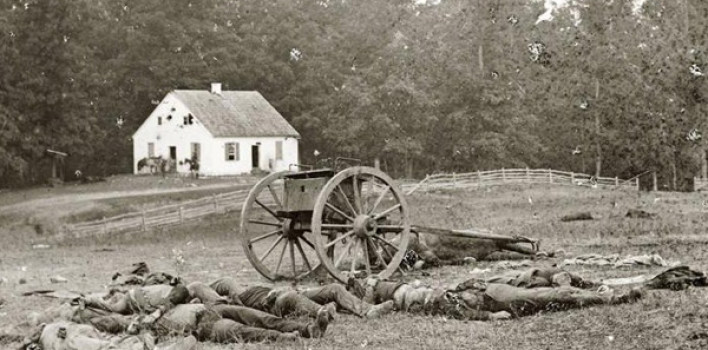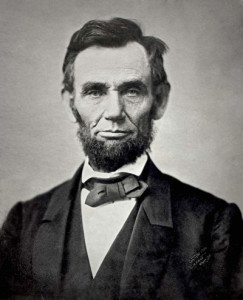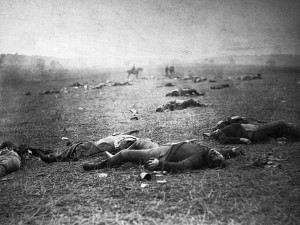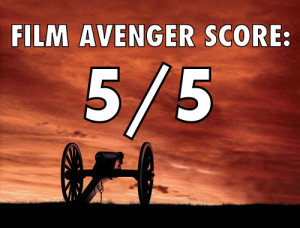Review| Ken Burns’ The Civil War – Hope in the Midst of Horror
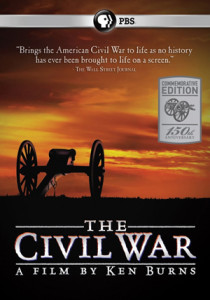 The Civil War is Ken Burns’ masterpiece. It is a triumph of historical documentary filmmaking that even Burns himself has not surpassed (though both Jazz and Baseball come incredibly close). This film (or television series, depending on your point of view) is the definitive cinematic retelling of the American Civil War – and is done with more care, precision and detail than any Hollywood drama based on the same event.
The Civil War is Ken Burns’ masterpiece. It is a triumph of historical documentary filmmaking that even Burns himself has not surpassed (though both Jazz and Baseball come incredibly close). This film (or television series, depending on your point of view) is the definitive cinematic retelling of the American Civil War – and is done with more care, precision and detail than any Hollywood drama based on the same event.
The story of the Civil War is ripe for cinema, and there have been many attempts. It’s a dramatic, epic story with heroes and villains, and a moral center. However, none have really undertaken the breadth and scope of the struggle like Ken Burns’ film. The Civil War‘s exhaustive length even adds to its power, as one feels as if one has been through a journey by the end. It gives this film a weight and understanding that a simple two-hour narrative could never do.
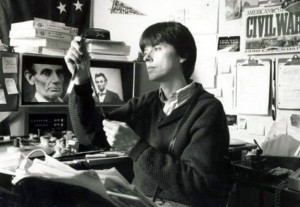 I credit The Civil War with sparking my interest in American history when I first saw it on television in 1990. Burns made history come alive for my young mind. The images and sound effects pierced my being and lingered in my thoughts for years after. These weren’t just paragraphs in a boring history book, but a story that actually happened, and there were real people who fought it. And what is even more astounding that it was all done with simple pans over static images!
I credit The Civil War with sparking my interest in American history when I first saw it on television in 1990. Burns made history come alive for my young mind. The images and sound effects pierced my being and lingered in my thoughts for years after. These weren’t just paragraphs in a boring history book, but a story that actually happened, and there were real people who fought it. And what is even more astounding that it was all done with simple pans over static images!
I re-watch The Civil War periodically, and just finished it again. It still retains its power and pull after all these years. This year is both the 25th anniversary of the film’s first broadcast and the 150th anniversary of the end of the war, and PBS marked the occasion with a re-broadcast of the film starting September 7, complete with an all-new HD remaster. The film has never looked better.
In this viewing, I really paid attention to the spiritual aspects of the conflict, and they both thrilled me and saddened me. The story told by Ken Burns is a tragic one, predicated on the sin of slavery and the pride of man. Both North and South invoked God in their respective struggles, and both, as Abraham Lincoln pointed out, could not be right. However, within the tragedy and bloodshed, there was something higher at work.
As I have gone on my walk with God, my stance on war itself has evolved. My mind has definitely changed to be in line with God’s will. However, I have not lost the realization that in this world of sin, some things must be fought, though the consequences will certainly be horrible.
The Good
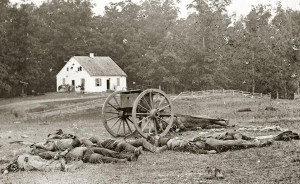 Burns’ camera gives life to history in a way no other filmmaker has. What would otherwise be a series of pans on static photographs and shots of hallowed vistas become a dramatic story fraught with meaning and purpose.
Burns’ camera gives life to history in a way no other filmmaker has. What would otherwise be a series of pans on static photographs and shots of hallowed vistas become a dramatic story fraught with meaning and purpose.
Burns also uses cinematic camera tropes to add to the narrative nature of his film – long shots, close-ups, establishing shots, quick cuts, etc. – quite revolutionary for a static-image documentary at the time. The sound effects enhance the images by sparking the imagination of the viewer. These different elements come together with an emotional pull that is hard to resist.
The cinematography of the live scenery is beautiful and haunting. There are no people in any of the shots, but in the mind’s eye, one can “see” them. It gives us the opportunity to imagine (gasp) – with the help of well-placed sound effects – the battles and bloodshed happening on the empty fields.
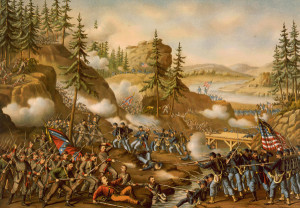 The photographs Burns chose to shoot are rife with emotional depth. The eyes of the people capture me every time. Their solemn and beleaguered faces linger in my mind for days, even weeks, after each viewing. They express a sense of helplessness and fatigue that touches the viewer.
The photographs Burns chose to shoot are rife with emotional depth. The eyes of the people capture me every time. Their solemn and beleaguered faces linger in my mind for days, even weeks, after each viewing. They express a sense of helplessness and fatigue that touches the viewer.
Burns holds on those solemn faces until one can’t help but feel the look in their eyes. It is unsettling, yet there is an emotional connection that is hard to explain. It is almost a tinge of guilt on my part – an emotional vulnerability coupled with grief at what lies behind those eyes.
The voice actors bring to life the firsthand accounts of the war in tones that add to the already overwhelming emotional makeup of the series. One can feel the ache and fatigue in these actors’ voices. They resurrect the emotion otherwise lost and bound forever to silent primary sources like letters, newspaper articles and other manuscripts from the period.
Vocally tying the whole thing together is the fabulous narrator, David McCullough. A celebrated historian in his own right, McCullough’s voice is one of the best narration voices ever. He has a matter-of-fact, believable, authoritarian quality, which is what one should want in a historical documentary.
 All of the interviewees in this documentary are engaging and bring their own expertise to the proceedings. Civil War author and historian Shelby Foote, who is shown in the film more than any other commentator, is particularly interesting to hear. His southern drawl is almost hypnotic, and the way he tells the stories is like a man who was actually there (though he wasn’t, of course).
All of the interviewees in this documentary are engaging and bring their own expertise to the proceedings. Civil War author and historian Shelby Foote, who is shown in the film more than any other commentator, is particularly interesting to hear. His southern drawl is almost hypnotic, and the way he tells the stories is like a man who was actually there (though he wasn’t, of course).
The Civil War is Ken Burns’ most fair film ideologically, which I appreciate from a historical perspective. Though the Confederacy was indeed the villain in this conflict for many reasons, the film gives an equal understanding and humanity to the Army of Northern Virginia.
The men who fought for the gray were just as human as those who fought for the blue, and the narrative maintains this notion throughout. These are not one-dimensional evil monsters, and neither was the North noble and virtuous at all times. I was glad that Burns and his writers Geoffrey C. Ward and Ric Burns stuck to the historical narrative as much as possible, mining those true and fair sources for emotional impact.
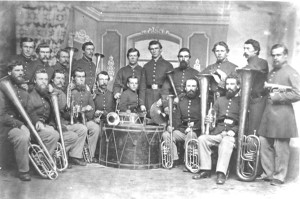 The real soul and emotion of the documentary comes from the music. Ken Burns brilliantly chose to use actual Civil War era tunes, played as they would have been back in that time.
The real soul and emotion of the documentary comes from the music. Ken Burns brilliantly chose to use actual Civil War era tunes, played as they would have been back in that time.
Jacqueline Schwab’s brilliant piano solos convey even the simplest of emotions in a scene. The same tune can be played in both a triumphant and melancholic way, depending on the need, bringing a sense of dramatic irony to the film.
The film’s de facto theme song, “Ashokan Farewell,” is my favorite songs of all time. It wasn’t composed at the time of the war, but it is a very versatile tune that evokes the feeling of the war period – the tragedy, hope, longing, desperation, suffering. All of it manifests itself in that one tune.
The Not-So-Good
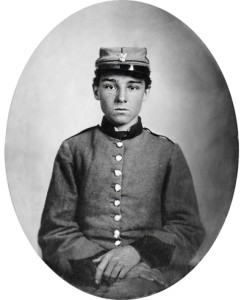 As much as I adore the music, I do have to admit that Burns and his team should have selected more songs to use throughout the documentary. Several songs are repeated (some multiple times in the same episode), and eventually lose their emotional impact. Perhaps some semblance of score could have filled in the gaps. Even “Ashokan Farewell,” as amazing as it is, gets played to death, and in places where it doesn’t make sense.
As much as I adore the music, I do have to admit that Burns and his team should have selected more songs to use throughout the documentary. Several songs are repeated (some multiple times in the same episode), and eventually lose their emotional impact. Perhaps some semblance of score could have filled in the gaps. Even “Ashokan Farewell,” as amazing as it is, gets played to death, and in places where it doesn’t make sense.
The voice work suffers from similar problems. Burns should have cast more voices to differentiate between characters. Even within the same episode, one voice speaks for several different characters – and most of the time without accents to separate them. These voices have very distinct characteristics, like Charley McDowell as Confederate Private Sam Watkins and his deep Southern timbre. Yet McDowell was used as the voice for many other Confederate soldiers, making Watkins’ writings (which we followed through the entirety of the film) sometimes indistinguishable.
If Burns wanted to designate a particular voice for the newspapers, for example, that would have been acceptable, since it’s from a particular point of view and the individual writer does not necessarily need to be known. But each main character needed to have a distinctive voice used only for that character.
“Here was the greatest and most moving chapter in American history – a blending of meanness and greatness, an ending and a beginning. It came out of what men were, but it did not go as men had planned. Of all men, Abraham Lincoln came the closest to understanding what had happened. Yet even he, in his final backward glance, had to confess that something that went beyond words had been at work in the land. The Almighty had His own purposes.” Bruce Catton
The Civil War was one of the most distinctly religious conflicts in which the United States has ever engaged. Throughout the film, letters, diary entries, presidential decrees, even military dispatches are littered with references to God. Men and women on both sides prayed for His favor in victory over their enemy. Many took victories in battle as a sign of God’s approval of their cause.
In 1862, as the war was in its darkest days, Abraham Lincoln wrote that “the will of God prevails. In great contests, each party claims to act in accordance with the will of God. Both may be, and one must be, wrong. God cannot be for and against the same thing at the same time…My concern is not whether God is on our side; my greatest concern is to be on God’s side, for God is always right.”
The Civil War started as a human conflict over the union of a man-made nation, but eventually elevated into something much bigger, much higher than anticipated. There was a literary quality to the story that caused one to really stop and think about what was taking place – all of the subtle, symbolic events within the conflict itself – pointing to an outcome more in line with the will of God.
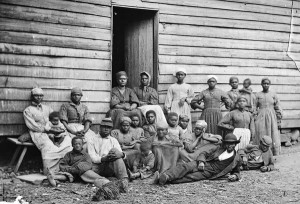 At the beginning of the war, President Lincoln avoided the idea of slave emancipation and stressed union above all other motives. But as the war progressed, Lincoln eventually saw God’s will manipulating events for a certain outcome. For men were not meant to be seen as another man’s property, but as individual creations of God – each one having a role to play in His plan.
At the beginning of the war, President Lincoln avoided the idea of slave emancipation and stressed union above all other motives. But as the war progressed, Lincoln eventually saw God’s will manipulating events for a certain outcome. For men were not meant to be seen as another man’s property, but as individual creations of God – each one having a role to play in His plan.
God, in His infinite wisdom, uses tragic events like war to His glory and as part of His plan. Paul wrote in the Book of Romans that “we know in all things God works for the good of those who love Him and are called according to His purpose.” (8:28) In other words, God can take something bad and use it for something good. But the good that comes from these terrible things may not be what makes us happy; it will be something that makes us more like Christ.
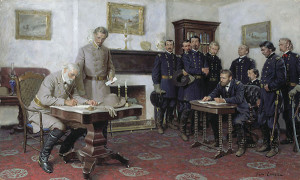 “You may forgive us, but we won’t be forgiven. There is a rancor in our hearts which you little dream of. We hate you, sir.” Confederate Henry Wise upon surrender at Appomattox Court House
“You may forgive us, but we won’t be forgiven. There is a rancor in our hearts which you little dream of. We hate you, sir.” Confederate Henry Wise upon surrender at Appomattox Court House
From the outset of the war, it was the Confederacy that was the aggressor, and pride was their central sin. It was pride in the whites’ supposed position as the “superior race” that guided the formation of their faulty and barbaric economic system, giving way to secession and war. It was also pride that engendered hatred toward the North during the Reconstruction period. And the purported piety of the people of the South could not mask their hatred for the Yankees.
Despite considering themselves devout Christians, the people of the Confederate states lacked the one thing that Jesus emphasized above all else: love and forgiveness of others, including their enemies. It was the entire reason why Jesus came to earth – to reconcile us to Him by dying on a cross. We as Christians are commanded to forgive those who have wronged us, and let go of hatred – just as Christ forgave us.
Southern pride and love of their earthly way of life clouded what should have been their Christlike desire for grace. The seething hatred also made way for the racism and violence that plagued the South for a century after the war (to be fair, the failures of the Reconstruction policies were also the fault of the North).
“‘If your enemy is hungry, feed him; if he is thirsty, give him something to drink. In doing this, you will heap burning coals on his head.’ Do not overcome by evil, but overcome evil with good.” Romans 12:19-21
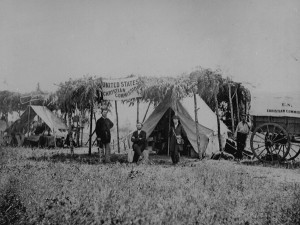 Though not perfect, the North better represented a sense of forgiveness and reconciliation at the end of the war. After the dissolution of the Confederacy, the southern states were welcomed back into the Union. For the most part, the men who had fought for the Southern cause were pardoned.
Though not perfect, the North better represented a sense of forgiveness and reconciliation at the end of the war. After the dissolution of the Confederacy, the southern states were welcomed back into the Union. For the most part, the men who had fought for the Southern cause were pardoned.
At the surrender at Appomattox Court House, General Ulysses S. Grant offered rations to the defeated Army of Northern Virginia. Grant described his feelings on the occasion and exemplified the forgiving heart:
“I felt like anything rather than rejoicing at the downfall of a foe who had fought so long and valiantly, and had suffered so much for a cause. Though that cause was, I believe, one of the worst for which people ever fought.”
Grant displayed a sense of mercy and grace toward General Robert E. Lee and his men. When Grant’s men started cheering after the surrender was finished, Grant stopped them. He respected Lee and his army as human beings and fellow soldiers, and wanted them to maintain their dignity rather than revel in their defeat or participate in acts of reprisal against them.
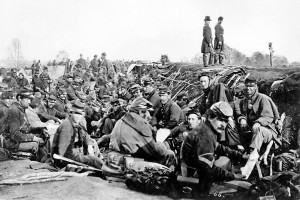 “I don’t think there is such a thing as a ‘good’ war. There are sometimes necessary wars. And I think one might say just wars. And I never questioned the necessity of that war. It was something that had to be done.” World War II Navy pilot Sam Hynes
“I don’t think there is such a thing as a ‘good’ war. There are sometimes necessary wars. And I think one might say just wars. And I never questioned the necessity of that war. It was something that had to be done.” World War II Navy pilot Sam Hynes
Because of the invocation of God on either side of the conflict, The Civil War caused me to ponder about the relation of war itself to Christ. War is a touchy subject for Christians. I have friends who come down on both sides of the issue – friends for whom I have great respect for their spiritual understanding.
Before I came to follow Christ, my understanding of war was one of selfish glory and vengeance. The enemy was evil and deserved everything that was coming to him, no matter what the conflict was about. My love and pride of country seemed to overtake me and fill me with a zeal about battle – similar to the Confederates. The enemies of the United States became almost non-human in my eyes, and deserved to be crushed like insects with no mercy.
When I became a Christian, my ideas of war were tempered by the Holy Spirit. For God does not want any person to perish not knowing Him, even those He would consider enemies (which, at one time or another, has been all of us). He loves everyone and anyone, and all are offered the chance to turn from their sin and become His children.
And yet, it is because of our sin that we have violence and war in this world. We can wish it away all we want, but the fact is that man is free to embrace his passions, no matter how reprehensible they might be. And it is pride that holds people to evil ideals and makes them willing to fight and die for them.
I know very many people, some of my fellow Christians, with their hearts in the right place, who think that all war is both wrong and avoidable. Those that hold this viewpoint would contend that soldiers in a war, no matter what the cause, are all committing atrocities and there is no room for distinction or justification.
While I would agree with the the fact that war is bad, I would respectfully disagree with the conclusions they reach. In a world plagued by sin, conflicts will come, and some of those conflicts must be fought. It is an unfortunate paradox that we must always be ready to fight in order to maintain some semblance of peace.
Tragic as it was, the Civil War was a war of necessity. The Confederacy had invoked the mantle of “states’ rights” as justification for the evil of slavery. Shelby Foote noted in the film that the Civil War was a consequence of a failure “to do the thing we really have a genius for, which is compromise.” I disagree because there are some things, like chattel slavery, that are so inherently immoral that there can be no amount of compromise between either side.
“Do not repay anyone evil for evil. Be careful to do what is right in the eyes of everyone. If it is possible, as far as it depends on you, live at peace with everyone.” Romans 12:17-18
It is important to note that Paul writes in the passage above to live in peace with others “if it is possible.” There are times when it isn’t possible because of people consumed by their sin and the righteousness of their cause. Though conflicts and violence will come, it is paramount not to revel in such violence. It must be tempered with grace and forgiveness.
The Civil War is a tremendously good film. Ken Burns has an unmistakable talent for drawing the life out seemingly lifeless sources of history, making us as the viewer feel the emotion of that horrible event.
The film is everything a historical documentary should be: straightforward storytelling, letting the event itself be the source for all drama and pathos, and as free from political and ideological biases as possible. It makes me that much sadder about Ken Burns’ more current documentary subjects – more preoccupied with promoting a flawed viewpoint than providing an instrument of education.
As General William Tecumseh Sherman noted, “War is cruelty, and you cannot refine it.” War should be avoided at all costs. We should be thankful to God that we have lived in a society for so long that has not had to feel the hard consequences of war. However, it is this perceived comfort that has enabled people to imagine a world without conflict, and a loss of historical perspective in the process.
In this world, we must be prepared to stand up to evil, but temper ourselves with the love of Christ toward those who do evil. We must not revel in the thought of violence or seek it out for our own personal satisfaction. Instead, we are to concentrate on God and all the good He is, letting Him guide us to be more in line with His plan.


